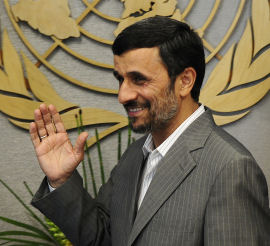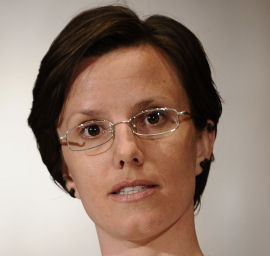Iranian President Ahmadinejad: 'future is Iran'
Updated on 20 September 2010
Iranian President Ahmadinejad is in New York to address the United Nations, but as he dodges questions over the two remaining US hikers held being in Tehran, Foreign Editor Lindsey Hilsum asks can he similarly deflect attention from the growing opposition movement within his own regime?

Iranian President Mahmoud Ahmadinejad is due to address the United Nations General Assembly this week, but it seems the President shouldn’t expect too warm a welcome from his US hosts.
In an interview with ABC on Sunday, US Secretary of State Hilary Clinton talked of last year's "flawed" election and accused Iran of drifting towards authoritarianism, she stated: "A lot of Iranians, even those who stayed (after the 1979 Revolution) are starting to say 'This is not what I signed up for'. And I can only hope that there will be some effort inside Iran, by responsible civil and religious leaders, to take hold of the apparatus of State."
Mrs Clinton's comments came as Iran ordered women's rights campaigner Shiva Nazar Ahari, the founder of Iran's committee of Human Rights Reporters, to serve six years in jail for crimes including "warring against God."
The sentence comes as global pressure grows against the threat to stone Sakineh Mohammadi Ashtiani for alleged adultery.
In his interviews with US media, Ahmadinejad called on the US Secretary of State to "think before she speaks."
He denied Ashtiani had ever been sentenced to death, describing the worldwide condemnation "propaganda".
Ahmadinejad remained steadfast on the nuclear question, as he denied his government is seeking to develop an atomic bomb, and dodged questions on the resumption of talks over their nuclear programme.
Instead he challenged the US to accept Iran as a major world player, dismissed the effect of sanctions, and declared: "The future belongs to Iran."
Pressure grows from all sides
Outsiders tend to class Iranian politicians and mullahs as 'reformist' or 'hardline' but President Ahmadinejad – who's doing the rounds of the US TV shows before the UN General Assembly in New York - is getting pressure from all sides, writes international editor Lindsey Hilsum.
Hashemi Rafsanjani, the head of the Guardian Council and a longstanding rival from the reformist camp, has criticised him for failing to acknowledge the hardship sanctions are causing. The sub-text: Rafsanjani thinks Ahmadinejad has brought a whole heap of problems on Iran's head by antagonising the west.
"Everyone will be happy if the government compensates traders for the costs of sanctions," said Mohammad Nahavandian, head of Iran's Chamber of Commerce, which – if you turn the statement the other way round – means that everyone will be very unhappy if they don't.
Then on Friday, Ayatollah Jannati, a hardliner, gave a veiled criticism of Ahmadinejad's plan to lift subsidies on basic commodities. "We will have a semi-abstemious period ahead of us," he said at Friday prayers.
Ahmadinejad has called the government plan to lift US$100bn worth of subsidies as "the biggest economic plan in the past 50 years". He says the impact on the poor will be mitigated by direct payments of money to the deserving.
The President is well known for giving donations – I've been in villages where he simply doled out money. During last year's elections, the opposition campaigned on the bizarre slogan 'Down with potatoes' because he had distributed potatoes at rallies.
The largely middle class 'Green Movement' which protested those elections has been suppressed – at least for the moment. But some think the reduction of subsidies on utilities such as electricity, and basic commodities such as petrol, may alienate another part of society: the poor, and the struggling working class.
The US government is said to believe that UN sanctions are really biting now. "Economic conditions have never been as bad as they are under Ahmadinejad," writes Hossein Askari, of George Washington University, in a thorough analysis of Iran's faltering economy. The subsidies are supposed to be lifted on September 23rd – and the people of Iran will feel their impact as the winter sets in.
"They violated the law"
The head of the UN, Ban Ki-moon met with Ahmadinejad on Sunday where he called on the President to "engage in a constructive manner" over nuclear talks and "respect fundamental rights."
The remark was seen as a thinly veiled reference to Sarah Shourd, the US hiker who was released by Iran last week. However her two male companions are still being held in Tehran.

The three Americans were arrested last July after allegedly straying over the border into Iran while hiking. The three were accused of espionage – a crime punishable by death in the Islamic Republic.
Speaking shortly after her arrival back in the United States on Sunday, Sarah Shourd, 32, again denied the spying charges, and described the incident as a "huge misunderstanding."
But she thanked Iran's government and religious leaders for her release.
Ahmadinejad refused to comment on the fate of two remaining prisoners Shane Bauer and Josh Fattal.
"We want people to be free and not to suffer. But in the end of the day, there's a law that determines who stays in prison and who does not. I would give a recommendation, but the cases have to be examined. They violated the law," he said.
The President called Shourd's release a humanitarian gesture, and used it to appeal for the release of eight Iranians prisoners held in the US: "I believe that it would not be misplaced to ask that the US government should take a humanitarian gesture to release the Iranians who were illegally arrested and detained here in the US."
Ahmadinejad's UN engagements:
A speech at the Millennium Development Goals summit (20 - 22 September)
Speech at the UN General Assembly session (23 - 30 September)
Speech at World Forum for Proximity of Islamic Schools of Thought summit
Tensions remain
Some analysts have speculated Clinton's blunt language over recent few days may be a sign that President Obama's administration is changing tack, from diplomatic engagement to the promotion of regime change.
There were signs at the weekend that opposition figures in Iran are heeding this call despite accusations that the White House has failed to offer them any real support.
Mehdi Karoubi, an opposition leader and former parliamentary speaker, wrote in an open letter to former President Akbar Hashemi Rafsanjani: "Chaos is evident in all of the Government's decisions ... The sanctions against us ... are due to the lack of wisdom, lack of expertise and continuous bragging by the Government, especially by the President."



